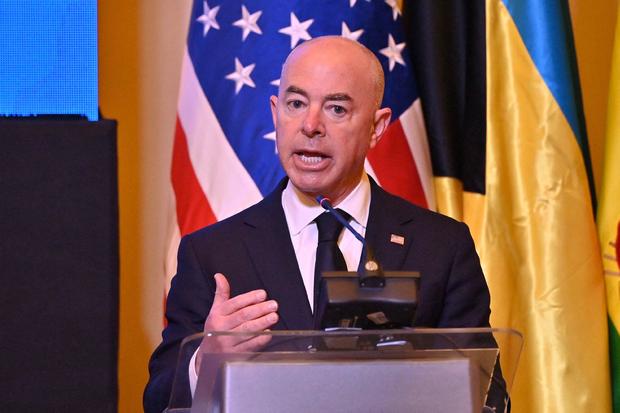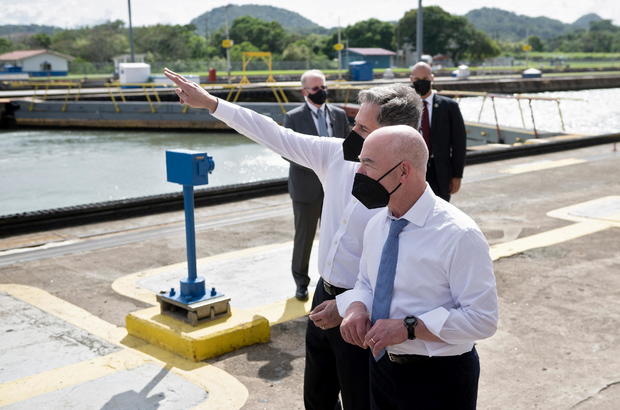The Secretary of National Security, Alejandro Mayorkas, recognized on Friday that the planned ending of the title 42 Border expulsions in May could pose “significant challenges” for the US government, but he stressed that his department is ready to implement change and deal with a possible surge in immigrant arrivals.
in a interview With CBS News on Friday, Mayorkas said the Department of Homeland Security (DHS) has erected migrant processing facilities, deployed additional medical and other personnel to the southern border and expanded migrant transportation capabilities as part of a multi-month plan.
Mayorkas, who met with officials in Panama this week, said the Biden administration is also asking for help from countries in the Western Hemisphere to reduce the current high levels of migration to the US border, including by convincing them to accept the asylum return. seekers and migrants rejected by the US
“The claim that we have no plans is a claim that is not supported by the facts,” Mayorkas said. “We have been planning for months to address increases in migration; those that we have already experienced and those that we could experience with the end of Title 42.”
Under Title 42, a pandemic-era rule put in place by the Trump administration in March 2020, the US has turned away hundreds of thousands of migrants on public health grounds.
LUIS ACOSTA/AFP via Getty Images
The Centers for Disease Control and Prevention’s decision to end Title 42 on May 23 angered Republican lawmakers and a growing number of more moderate Democrats who don’t think Mayorkas and his department are prepared to face a surge. even greater migration. Texas and other Republican-led states are asking federal courts to block termination of the policy.
Migrant apprehensions along the US-Mexico border soared to 221,000 in March, a maximum of 22 years. Mayorkas noted that many arrests represent repeated crossings by the same people, a phenomenon he said DHS will work to reduce through criminal prosecution.
“Those individuals who make repeated attempts, who seek to defy the law, are subject to criminal prosecution in appropriate circumstances,” Mayorkas said. “And we’re working collaboratively with the Justice Department to do that.”
In the past two years, Title 42 has allowed US border agents to remove immigrants more than 1.8 million times without screening them for asylum. Roughly 75% of those evictions have occurred under President Biden. Yet his administration has also reported nearly 2.5 million immigrant arrests in 14 months, DHS data shows.
The CDC determined earlier this month that Title 42 was no longer necessary to slow the spread of the coronavirus. Many public health experts and even CDC officials had questioned the validity of that rationality.
Once Title 42 ends, Mayorkas said immigrants who don’t qualify for US asylum will be deported under regular immigration procedures. But US officials have had trouble returning large numbers of migrants to certain countries such as Cuba, Nicaragua and Venezuela due to strained relations with the governments of those countries.
Concerns about these deportation limits have recently intensified as more migrants arrive at the US border from countries beyond Mexico, El Salvador, Guatemala, and Honduras, where the US conducts regular deportations. In March, 32,000 Cubans and 16,000 Nicaraguans entered US border custody, both records.
Mayorkas said that one of the objectives of his trip to Panama was to underline the collective responsibility that countries have to manage the migratory flows that affect most of the region, including the need to facilitate the “safe return” of migrants to their countries of origin.
“We talked about the responsibility to manage the borders throughout the region in a humane way that complies with the law, meaning that those who qualify for relief in a particular country receive that relief and those who do not are repatriated,” he said. .
Mayorkas said one element of the separate discussions with Cuban officials this week was ensuring that the island nation accepts deportations of its citizens as part of an Obama-era deal that also committed the United States to facilitating the legal migration of Cubans. Cubans with relatives. members in the US
However, dealing with other countries will be more difficult, Mayorkas noted. In those cases, he said the United States would engage other countries with warmer American ties to “participate in the solution.”
“It is quite challenging to deal with a country like Venezuela, where diplomatic relations, if they exist at all, can be strained. And so we have to be practical here to address the realities,” Mayorkas said.
Brendan Smialowski/Pool via REUTERS
In addition to collaboration on deportations, Mayorkas said other pillars of the administration’s regional efforts on migration include facilitating the integration of asylum seekers who are allowed to live in new countries, expanding legal pathways for those seeking to migrate and help nations retain their residents by investing in struggling communities.
The regional approach, Mayorkas said, is necessary because the United States is not the only country receiving migrants, citing the large displaced populations of Venezuelans in Colombia and Nicaraguans in Costa Rica. He said the ultimate goal is to prevent people from attempting “dangerous” trips that can sometimes be fatal.
“Visited the Darienextraordinarily treacherous terrain, and I learned firsthand the dire consequences of that undertaking,” Mayorkas said, referring to the roadless jungle region connecting Panama and Colombia that many migrants travel through on their way to the U.S.
Republicans have strongly criticized the administration’s immigration strategy, blaming it for the record number of arrivals at the border last year.
Republicans have said the unprecedented migration flows have been fueled by the Biden administration’s reversal of some Trump-era restrictive border policies, its more sympathetic rhetoric toward migrants, and the release of hundreds of thousands of migrants and asylum seekers. in the last year.
Mayorkas is expected to face this criticism head-on when he appears before the House Judiciary Committee next week.
“The American people deserve answers and accountability for the lawlessness of the Biden administration along the Southwest border,” said Ohio Congressman Jim Jordan, the top Republican on the Judiciary Committee. saying earlier this week announcing Mayorkas’ appearance before the panel on April 28.
In Friday’s interview, Mayorkas said members of Congress can offer a permanent solution to the challenges along the US-Mexico border. Asked if he will ask Congress for more funding or legal authority to address Title 42 changes, Mayorkas said legislative reform is needed.
“We are operating within the confines of a system that is completely broken, and is long overdue for a legislative fix,” he added.



